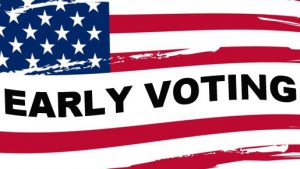
Early Voting


Now is the time to stock up or restock those school and office supplies. This weekend, August 7th, 8th, and 9th Florida will be having it’s annual sales tax holiday. Florida first held a sales tax holiday for school supplies in 2007.
During this sales tax holiday period, Florida law directs that no sales tax or local option tax (also known as discretionary sales surtax) will be collected on:
• purchases of clothing, footwear, and certain accessories selling for $60 or less per item,
• purchases of certain school supplies selling for $15 or less per item, and
• the first $1,000 of the sales price of personal computers and certain computer-related accessories, when purchased for noncommercial home or personal use.
For more information and a detailed list click here: https://floridarevenue.com/backtoschool/Pages/default.aspx
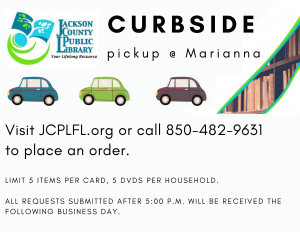
The Florida Department of Health is urging all Floridians to answer calls from (833) 917-2880 as this is part of Florida’s comprehensive contact tracing effort. If you receive a call from this number they are saying it is important that you speak to a contact tracer regarding potential COVID-19 exposure.
The newest catch phrase seems to be remember the 3 C’s. Avoid close spaces, crowded-spaces, and close-contact situations. And as always wash hands for at least 20 seconds with soap and warm water, cough into your elbow, and don’t go into public if possible while you are sick.
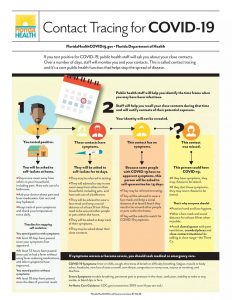
August is known for many things, including the dog days of summer, National Watermelon Day (Aug. 3) and National Smile Week (Aug. 5-11). But there are many other fun facts associated with summer’s last full month. The month of August is often referred to as the “dog days of summer” but not because of pet pooches. It has to do with the star Sirius, also known as the dog star, which rose at the same time as sunrise during the month of August in ancient Roman times.
~August is named after Augustus Caesar, founder and the first emperor of the Roman Empire, who was posthumously adopted by his maternal great-uncle Gaius Julius Caesar. In the early Roman calendar, August was actually the sixth month of the year. It was originally 30 days in length, but an extra day was added so that it would equal the number of days in July, which was named after Julius Caesar.
~August has two birthstones: peridot and sardonyx. Peridot is among the oldest known gemstones and is green in color. Sardonyx, which is lesser-known, is a white- and brown-banded gemstone once believed to have mystical powers.
~The official flower for August is the gladiolus. These vertical-growing flowers were named from the Latin “gladius,” meaning a sword.
~Fans of Elvis Presley mourn each Aug. 16th, the day the famed singer died in 1977.
~People born in August fall under the sun zodiac signs of Leo and Virgo. Leos are known to be dramatic, creative and outgoing. Virgos have acute attention to detail and are the people most likely to dedicate themselves to serving. They also are loyal, hardworking and analytical.
~On Aug. 21, 1911, the Mona Lisa was stolen from the Louvre Gallery and not recovered for two years.
~Although civil rights activist Martin Luther King, Jr., is honored in January, when he was born, he is best known for his famed “I have a dream” speech, which was given on Aug. 28, 1963.
~Some famous people born in August include Martha Stewart, Martin Sheen, Jeff Gordon, Deion Sanders. Matthew Perry, John Stamos, Magic Johnson, Patrick Swayze, and Halle Berry.
Happy last month of the summer~

Today is an international day of recognition for human trafficking crimes. The World Day against Trafficking in Persons is dedicated to bringing awareness to the horrific crime that is human abduction and trafficking. This is a global crime that targets and exploits women, men, and children for horrible purposes such as forced labor and sexual molestation. People may feel that this is the type of thing that only happens in specific areas or on TV crime shows or as a bad plot for action movies starring Liam Neeson – but the reality is much sadder and so horrific.
The Panhandle is not immune to human trafficking. In fact, just last November a Pensacola business owner named David C. Williams pleaded guilty to trafficking women to provide prostitution services out of his massage parlors (amongst other charges like money laundering). Additionally, the state of Florida is ranked SECOND in the country for highest number of human trafficking reports received by the National Human Trafficking Hotline.
If you are interested in learning more about how you can bring awareness on how to spot human trafficking, report it, and fight it in your life and community, please check out the local organization Called2Rescue located in Pensacola. This non-profit organization as founded by Brad Dennis in 2013 and was created to “educate, empower and mobilize an alliance of local churches and community partners to search for and rescue trafficked and exploited persons in our area.” Additionally, the Florida Coalition Against Human Trafficking is an excellent source of information and resources.
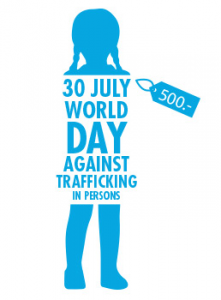

The Gathering is hosting a night of hope. Friday, July 31st at 6pm at Hope Park on 159 Bear Creek Road in Eastpoint. They will have free food, fellowship, worship, dance, and word.
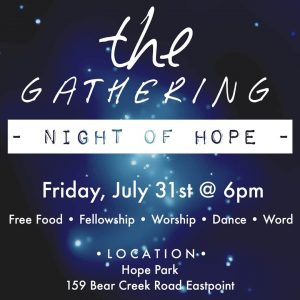
July is national blueberry month. Blueberries are native to North America, and they are grown in 35 out of 50 states. North America supplies blueberries to 95% of the world. Currently, the four-week harvesting between late March and April can supple the whole United States.
Why are blueberries considered to be a superfood? Eating just a quarter cup of blueberries daily can make a significant impact on your health. Here are a few facts about blueberries.
Did you know that blueberries, packed with fiber and antioxidants, have also been linked to reduced arthritis pain, improved joint flexibility, and lower levels of inflammation? Also a great tip for teething tots is to freeze a container of blueberries and put in a netted teether for instant relief!
